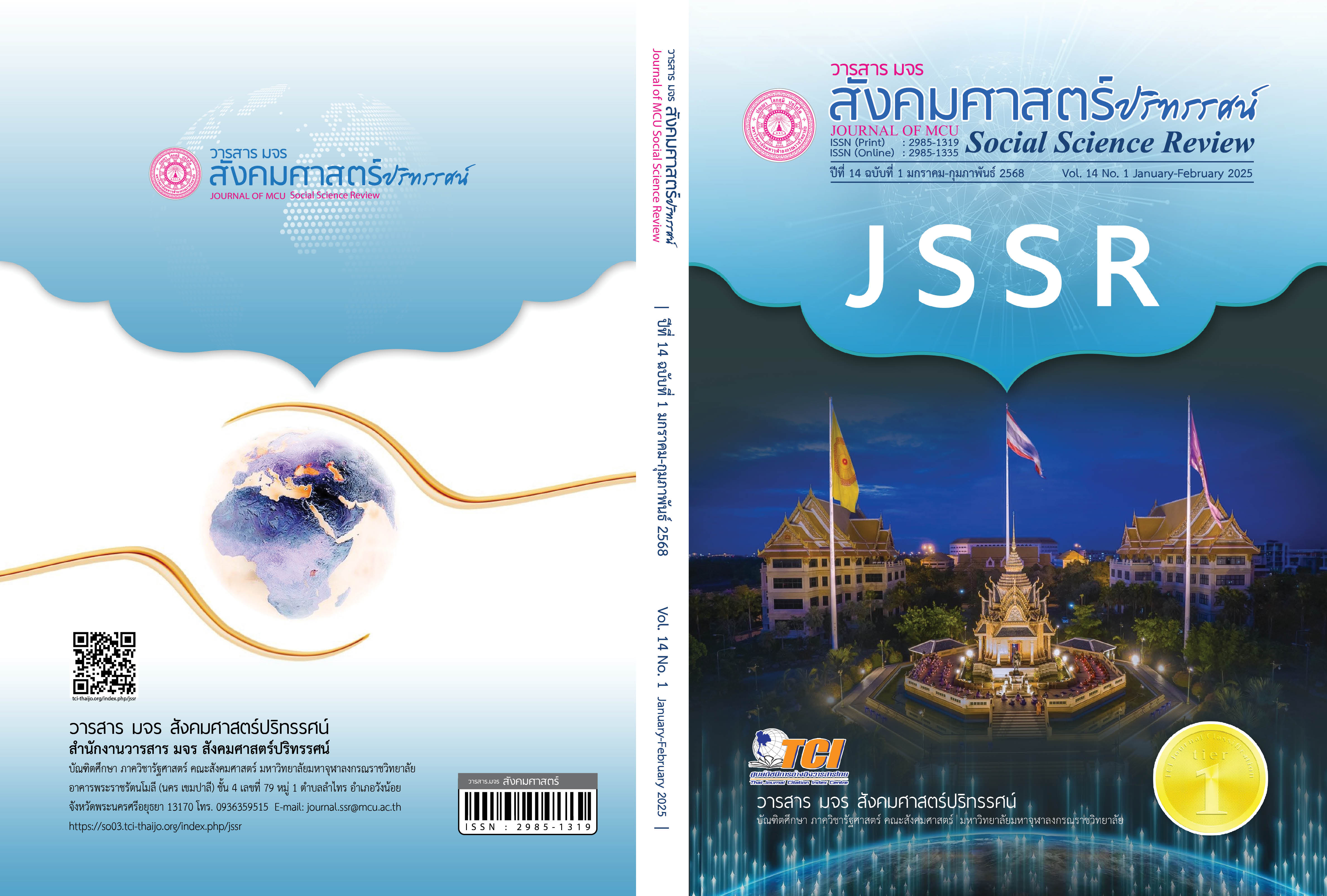การพัฒนาสมรรถนะครูด้านการจัดการเรียนรู้ทักษะแห่งอนาคต
คำสำคัญ:
ทักษะแห่งอนาคต, สมรรถนะครู, หลักสูตรฝึกอบรมบทคัดย่อ
บทความวิจัยนี้มีวัตถุประสงค์ 1. ศึกษาความต้องการจำเป็นในสมรรถนะครูด้านการจัดการเรียนรู้ทักษะแห่งอนาคต 2. พัฒนาหลักสูตรฝึกอบรม 3. ใช้หลักสูตรฝึกอบรม 4. ศึกษาความพึงพอใจ และ 5. สร้างเครือข่ายสมรรถนะครูด้านการจัดการเรียนรู้ทักษะแห่งอนาคต เป็นเป็นการวิจัยแบบผสานวิธี กลุ่มเป้าหมายระยะที่ 1 ครู จำนวน 150 คน ระยะที่ 2 ผู้เชี่ยวชาญ จำนวน 5 คน ระยะที่ 3 ครูผู้สอน จำนวน 50 คน และระยะที่ 4 ครูจำนวน 42 คน เครื่องมือที่ใช้ ได้แก่ หลักสูตรฝึกอบรม คู่มือการใช้หลักสูตร แบบทดสอบ แบบประเมินสมรรถนะครู และแบบสอบถามความพึงพอใจ สถิติที่ใช้ ได้แก่ ค่าร้อยละ ค่าเฉลี่ย ส่วนเบี่ยงเบนมาตรฐาน การวิเคราะห์เนื้อหา และการทดสอบที
ผลการวิจัยพบว่า 1. ความต้องการจำเป็นในสมรรถนะครูด้านการจัดการเรียนรู้ทักษะแห่งอนาคต โดยภาพรวม อยู่ในระดับมากที่สุด 2. หลักสูตรการฝึกอบรมพัฒนาสมรรถนะครู ด้านการจัดการเรียนรู้ทักษะแห่งอนาคต ประกอบด้วย ความเป็นมาของหลักสูตรฝึกอบรมหลักการของหลักสูตรฝึกอบรม วัตถุประสงค์ของหลักสูตรฝึกอบรม เนื้อหาสาระของหลักสูตรฝึกอบรม โครงสร้างของหลักสูตรฝึกอบรม จำนวน 18 ชั่วโมง การจัดกิจกรรมของหลักสูตรฝึกอบรม สื่อ วัสดุ อุปกรณ์ของหลักสูตรฝึกอบรม และการวัดและประเมินผลของหลักสูตรฝึกอบรม โดยหลักสูตรมีความเหมาะสม ภาพรวมอยู่ในระดับมาก 3. ความรู้ความเข้าใจของครูต่อการจัดการเรียนรู้ทักษะแห่งอนาคต หลังการฝึกอบรมสูงกว่าก่อนฝึกอบรม อย่างมีนัยสำคัญทางสถิติที่ระดับ .05 4. ครูมีความพึงพอใจต่อการใช้หลักสูตรฝึกอบรม ภาพรวมอยู่ในระดับมาก และ 5. การสร้างเครือข่ายการพัฒนาสมรรถนะครูด้านการจัดการเรียนรู้ทักษะแห่งอนาคต พบว่า ครูมีสมรรถนะด้านการจัดกิจกรรมการเรียนรู้และด้านการวัดและประเมินผลการเรียนรู้ทักษะแห่งอนาคต อยู่ในระดับมากที่สุด ด้านการออกแบบและเขียนแผนการจัดการเรียนรู้และด้านการออกแบบและการใช้สื่อประกอบจัดการจัดกิจกรรมการเรียนรู้ อยู่ในระดับมาก ครูมีความพึงพอใจ อยู่ในระดับมากที่สุด นอกจากนั้น สมาชิกครูมีการสร้างความตระหนักการติดต่อสื่อสารผ่านช่องทางต่าง ๆ การแลกเปลี่ยนเรียนรู้ และการต่อยอดความรู้ เป็นต้น
เอกสารอ้างอิง
กิติมา ปรีดีดิลก. (2549). ปรัชญาการศึกษา. กรุงเทพฯ: ประเสริฐการพิมพ์.
กัลยา ตากูล. (2550). การศึกษาการจัดการเรียนการสอนและสภาพแวดล้อมเพื่อส่งเสริมทักษะการคิดและกระบวนการคิดแก้ปัญหาอนาคตของนักเรียนระดับชั้นมัธยมศึกษาที่ 3 : กรณีศึกษาโรงเรียนวชิราวุธวิทยา (วิทยานิพนธ์ปริญญามหาบัณฑิต สาขาวิชาวิจัยการศึกษา). กรุงเทพฯ: จุฬาลงกรณ์มหาวิทยาลัย.
ชนิสรา อริยะเดชช์. (2562). การพัฒนาหลักสูตรฝึกอบรมการจัดการเรียนรู้เพื่อพัฒนาทักษะการคิดวิเคราะห์ของครูกลุ่มสาระการเรียนรู้คณิตศาสตร์ ระดับประถมศึกษา. วารสารมหาวิทยาลัยราชภัฏมหาสารคาม, 13(3), 149-157.
ดวงใจ สีเขียว และคณะ. (2565). การพัฒนาหลักสูตรฝึกอบรมเพื่อส่งเสริมสมรรถนะการออกแบบการจัดการเรียนรู้สำหรับครูประถมศึกษาในการเสริมสร้างสมรรถนะการคิดขั้นสูงของผู้เรียน. วารสารมนุษยศาสตร์และสังคมศาสตร์มหาวิทยาลัยอุบลราชธานี, 13(1), 223-247.
ธำรง บัวศรี. (2542). ทฤษฎีหลักสูตร การออกแบบและพัฒนา (พิมพ์ครั้งที่ 2). กรุงเทพฯ: ธนธัชการพิมพ์.
วิชัย ประสิทธิ์วุฒิเวชช์. (2542). การพัฒนาหลักสูตรสานต่อที่ท้องถิ่น. กรุงเทพฯ: เซ็นเตอร์ดิสคัฟเวอรี่.
ศันสนีย์ เชาวนกุล. (2565). การพัฒนาศักยภาพครูในการใช้สื่อเทคโนโลยีสารสนเทศเพื่อการจัดการเรียนรู้โรงเรียนพิชัยรัตนาคาร สำนักงานเขตพื้นที่การศึกษามัธยมศึกษา พังงา ภูเก็ต ระนอง (การค้นคว้าอิสระมหาบัณฑิต สาขาวิชาการบริหารการศึกษา). มหาวิทยาลัยราชภัฏสุราษฎร์ธานี.
สมคิด บางโม. (2559). การภาษีอากรธุรกิจ. กรุงเทพฯ: ซีเอ็ดยูเคชั่น.
สุมิตร คุณานุกร. (2550). หลักสูตรและการสอน (พิมพ์ครั้งที่ 3). กรุงเทพฯ: ชวนชม.
สุริยา เหมตะศิลป์. (2553). การพัฒนาผู้เรียนหรือการปรับปรุงการเรียนการสอนด้วยกระบวนการวิจัยเชิงปฏิบัติการ. สงขลา: มหาวิทยาลัยทักษิณ.
สำนักงานเลขาธิการสภาการศึกษา. (2562). รายงานผลการวิจัยและพัฒนากรอบสมรรถนะผู้เรียนระดับประถมตอนต้นสำหรับหลักสูตรการศึกษาขั้นพื้นฐาน. กรุงเทพฯ: 21 เซ็นจูรี่.
Hough, B. & Duncan, K. (1970). Teaching description and analysis. USA: Addison-Wesley.
McClelland, G. H. (1993). Statistical difficulties of detecting interactions and moderator effects. Psychological bulletin, 114(2), 376.
Parry, K. W. (1998). Grounded theory and social process: A new direction for leadership research. The leadership quarterly, 9(1), 85-105.
ดาวน์โหลด
เผยแพร่แล้ว
รูปแบบการอ้างอิง
ฉบับ
ประเภทบทความ
สัญญาอนุญาต
ลิขสิทธิ์ (c) 2024 วารสาร มจร สังคมศาสตร์ปริทรรศน์

อนุญาตภายใต้เงื่อนไข Creative Commons Attribution-NonCommercial-NoDerivatives 4.0 International License.
เพื่อให้เป็นไปตามกฎหมายลิขสิทธิ์ ผู้นิพนธ์ทุกท่านต้องลงลายมือชื่อในแบบฟอร์มใบมอบลิขสิทธิ์บทความให้แก่วารสารฯ พร้อมกับบทความต้นฉบับที่ได้แก้ไขครั้งสุดท้าย นอกจากนี้ ผู้นิพนธ์ทุกท่านต้องยืนยันว่าบทความต้นฉบับที่ส่งมาตีพิมพ์นั้น ได้ส่งมาตีพิมพ์เฉพาะในวารสาร มจร สังคมศาสตร์ปริทรรศน์ เพียงแห่งเดียวเท่านั้น หากมีการใช้ภาพหรือตารางหรือเนื้อหาอื่นๆ ของผู้นิพนธ์อื่นที่ปรากฏในสิ่งตีพิมพ์อื่นมาแล้ว ผู้นิพนธ์ต้องขออนุญาตเจ้าของลิขสิทธิ์ก่อน พร้อมทั้งแสดงหนังสือที่ได้รับการยินยอมต่อบรรณาธิการ ก่อนที่บทความจะได้รับการตีพิมพ์ หากไม่เป็นไปตามข้อกำหนดเบื้องต้น ทางวารสารจะถอดบทความของท่านออกโดยไม่มีข้อยกเว้นใดๆ ทั้งสิ้น





